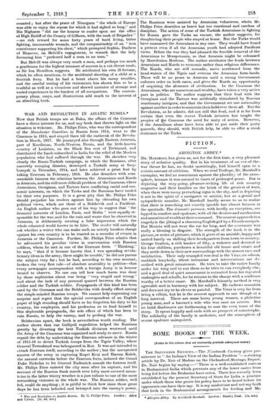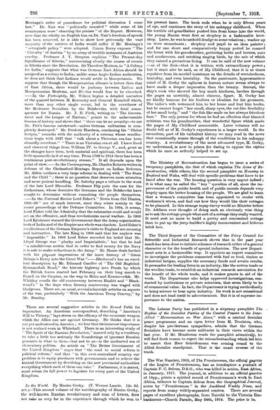SOME BOOKS OF THE WEEK.
plaice in this column doss not neassarily preclude subsequent review] THE Sareseaeaa REVIEWS.—The Nineteenth Century gives pro- minence to " An Indian's View of the Indian Problem "—a striking article by Dr. Nair of Madras on the Chelmsford-Montagu Report.
Dr. Nair begins by saying There is a well-established custern in Brahminical India which prevents any of the lower castes from being fed before the Brahmins have eaten. There has recently been established by the present Secretary of State for India a practice under which those who praise his policy have to be heard before its opponents can have their say. It is my misfortune and not my fault that both in the Brahminical arrangements for feeding and Mr.
• sIbiallon Abbey. By Arcalbald MArshall. London: Stanley Nal. 17s. Deal Montagu's order of precedence for political discussion I come last." Dr. Nair was " politically muzzled " while some of his countrymen were " chanting the praises " of the Report. However, now that the wholly un-English ban on Dr. Nair's freedom of speech has been removed, he is able to show how grievously the vast majority of the natives of India would suffer if Mr. Montagu's " retrograde policy " were adopted. Canon Barry exposes " The Chivalry ' of Austria " by an array of terrible instances of Austrian cruelty. Professor J. Y. Simpson explains " The Present-day Significance of Siberia," summarizing clearly the course of events in Siberia since the Revolution. Sir Theodore Morison, in "A Colony for India," suggests that what was German East Africa should be assigned as a oolony to India; unlike some Anglo-Indian authorities, he does not think that Indians would settle in Mesopotamia. We suppose that though the Mesopotamian climate is better than that of East Africa, there would be jealousy between Indian and Mesopotamian Moslems, and Hindus would fear to be absorbed. —In the Fortnightly, Mr. Wilcox begins a detailed narrative of the quarrel between M. Kerensky and General Komiloff which, more than any other single event, led to the overthrow of the Moderate Socialists by the Bolsheviks, with fatal conse- quences for Russia. Mr. J. B. Firth, writing on " The Govern- ment and the League of Nations," points to the unfavourable lessons of history and shows that " there can be no security—to use Mr. Pitt's famous catchword—unless German militarism is com- pletely destroyed." Mr. Frederic Harrison, continuing his " Obiter Scripts," remarks with the authority of a veteran whose recollec- tions begin with 1837 that " talk about a Victorian era has been absurdly overdone." " There is no Victorian era.at all. I have lived and observed things from William IV. to George V., and, great as the changes have been, both material and spiritual, there has been little spasmodic in it at any time. From 1789 to 1918 there has been a continuous post-revolutionary stream." It all depends upon the point of view.—In the Contemporary, Mr. Charles Roberts writes in defence of the Chelmsford-Montagu Report on Indian Reforms. Mr. Alden outlines a very large scheme in dealing with " The State and the Child " ; there is no question that deserves more attention and more patient handling. Dr. Saleeby pays a tribute to the work of the late Lord Rhondda. Professor Piip puts the case for the Esthonians, whose destinies the Germans and the Bolsheviks have sought to determine without consulting the people themselves. —In the National Review Lord Esher's " Notes from Old Diaries, 1901-09 " are of muoh interest, since they relate mainly to the secret proceedings of the Defence Committee. In 1904, it seems, Lord Maher told the Admiralty that the submarine could and would act on the offensive, and thus revolutionize naval warfare. In 1906 Lord Kitchener warned the Government that the Army organization both of India and of the Empire as a whole was obsolete. Lord Esher's recollections of the German Emperor's visits to England are amusing and instructive. The late King in 1908 said that his nephew was " impossible." In 1909 Lord Esher recorded his belief that Mr. Lloyd George was " plucky and Imperialistic," but that he had " a mischievous notion that in order to find money for the Navy it is safe to make reductions in the Army." Mr. Maxse deals further with his piquant impressions of the inner history of " Great Britain's Entry into the Great War."—Blackwood's has an excel- lent description by Mr. Edmund Candler of " The Old Baghdad-
Kermanshah Road," the historic highway into Persia by which the British forces started last February on their long march to Enzeli on the Caspian, on the way to Baku and Krasnovodek. Mr.
Whibley recalls the old controversy between Hazlitt and " Black- wood's " in the days when literary controversy was waged with bludgeons. There are, as usual, severaladmirable articles on aspects of the war, particularly " With the American Troop Convoy," by Mr. Stanley.



























 Previous page
Previous page